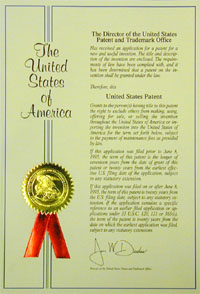Patent Attorney Position
A patent attorney at Knox Patents must be a self-starter who wants to work in a small firm. Working in a small firm requires that each person be self-reliant and able to work independently. Every attorney is involved in all aspects of intellectual property law. Versatility is important.
Patent attorneys at Knox Patents must be familiar with the electrical and mechanical arts. And, although the firm's focus is on patent prosecution, patent lawyers at Knox Patents must be able to work in all areas of intellectual property, including patents, trademarks, and copyrights.
What does it take to be a good patent attorney or agent? A love for writing. An inquisitive mind. A mechanical or technical bend. Some of the most successful patent attorneys are those who, as a youngster, enjoyed tearing things apart to find out how they worked. Ideally, they are someone who has an inquisitive mind. For another example, consider how some use a dictionary. Many with an inquisitive mind use a dictionary to look up one word, and, a half hour later, put the dictionary away after having read the definitions of many other words. The search for one bit of information leads an inquisitive mind on a journey that does not always stop when the sought-after information is found. Another important trait of a good patent attorney is the ability to quickly grasp the essence of the invention when talking with an inventor.
Candidates must be very familiar with computers and be comfortable using a word processor, Adobe Acrobat, and e-mail. Candidates must either already be a member of the patent bar or be eligible to sit for the patent bar exam. Patent Attorneys at Knox Patents are encouraged to develop relationships with clients and to expand their areas of practice.
Employment at a Solo or Tiny Law Firm
Currently, Knox Patents is a small IP firm with one patent attorney. When considering employment with a small firm, it is important to consider the distinction between a tiny firm and a larger firm.
To be successful, a solo attorney must have the temperament to run a solo practice. Besides being competent and efficient, a solo attorney must be self-reliant, self-motivated, proactive, and driven to succeed. A solo attorney is an entrepreneur running a small business, with all the baggage that comes with running a small business. A solo attorney is also one who wants to be rewarded for his efforts and recognizes that he is solely responsible for his future.
An attorney who joins a tiny law firm is essentially going solo. The second or third attorney need not worry about setting up the practice and the firm infrastructure. The financial pressure is somewhat relieved for the new attorney, as are some of the risks of solo practice. But the second or third attorney still needs to have the temperament to be a solo attorney for the tiny firm to succeed.
Any attorney joining a small firm must accept that their success depends entirely upon their performance. A small firm has no safety net like a larger firm. Not only must an attorney do their legal work, they must do their own patent figure drafting, generate bills for their work, collect those bills, handle the administrative aspects of their practice, seek out new clients, train the support staff, and get things done when the support staff is unavailable.
Top
|
